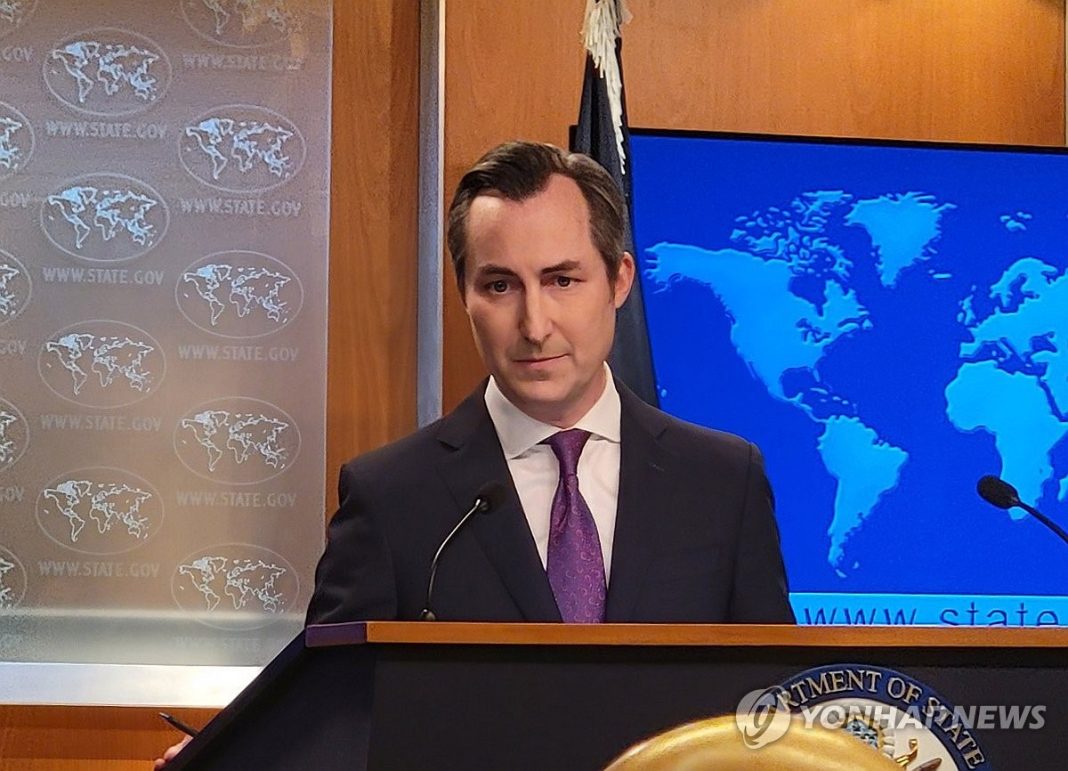(ATTN: ADDS Pentagon spokesperson’s remarks in paras 10-13)
By Song Sang-ho
WASHINGTON, April 1 (Yonhap) — The United States is “incredibly concerned” over Russia’s veto last week of a U.N. Security Council (UNSC) resolution meant to extend the mandate of an expert panel monitoring the enforcement of sanctions against North Korea, a State Department spokesperson said Monday.
Matthew Miller, the spokesperson, made the remarks, vowing to enforce a “full range” of anti-Pyongyang sanctions.
In a UNSC vote on Thursday, Moscow vetoed the resolution on the annual renewal of the panel’s mandate. Absent the resolution, its mandate is set to expire on April 30.
“(The U.S. is) incredibly concerned. It’s unfortunate that Russia … decided to exercise their veto. This is a panel whose work has previously been extended unanimously,” Miller told a press briefing.
He also noted the possibility of a deal between Pyongyang and Moscow over Russia’s exercise of the veto.
“I think it’s clear what happened here is that Russia made a bargain with the DPRK in return for the DPRK arming it in its war against Ukraine,” he said. “And now, we are seeing Russia deliver on its end of the bargain.”
This photo, taken on Feb. 27, 2024, shows State Department spokesperson Matthew Miller speaking during a press briefing at the department in Washington. (Yonhap)
DPRK stands for North Korea’s official name, the Democratic People’s Republic of Korea.
Miller reaffirmed Washington’s commitment to ensuring full sanctions enforcement.
“We still have a full range of sanctions on North Korea and we will continue to enforce those,” he said.
In related news, Deputy Pentagon Press Secretary Sabrina Singh said that the relationship between the North and Russia continues to “flourish.”
“We do assess that the partnership continues to flourish, that North Korea does continue to provide support to Russia,” she told a press briefing. “We do believe that support continues but I don’t have anything to share in terms of recent shipments or anything like that.”
Asked to elaborate how the partnership flourishes, Singh said it continues to grow.
“We continue to see Russia reach out to partners like North Korea, to Iran, to continue to get support for its war in Ukraine,” she said. “We continue to stand with Ukraine for however long it takes.”
Russia’s veto of the UNSC resolution followed intense negotiations among UNSC members, during which Moscow was said to have called for a “sunset clause” for UNSC sanctions against Pyongyang — a demand apparently unacceptable to Seoul, Washington, Tokyo and other UNSC members.
The sunset clause, if adopted, would leave anti-Pyongyang sanctions in effect only for a certain period of time unless there was a UNSC agreement to keep them in place for another agreed-upon period.
Analysts have voiced concerns that the abolition of the panel, if realized, would chip away at international efforts to curb its growing nuclear and missile threats through sanctions and other means.
“The termination of the panel further erodes the multilateral sanctions regime against North Korea and forces the United States and other countries to pursue more unilateral, bilateral or minilateral efforts to crack down on North Korea,” Frank Aum, a senior expert at the United States Institute of Peace, told Yonhap News Agency via email.
“Ultimately, this scenario represents not just a crisis for advocates of pressure and sanctions against North Korea, but also the broader functioning of the UNSC and the post World War II international order,” he added.
sshluck@yna.co.kr
(END)


